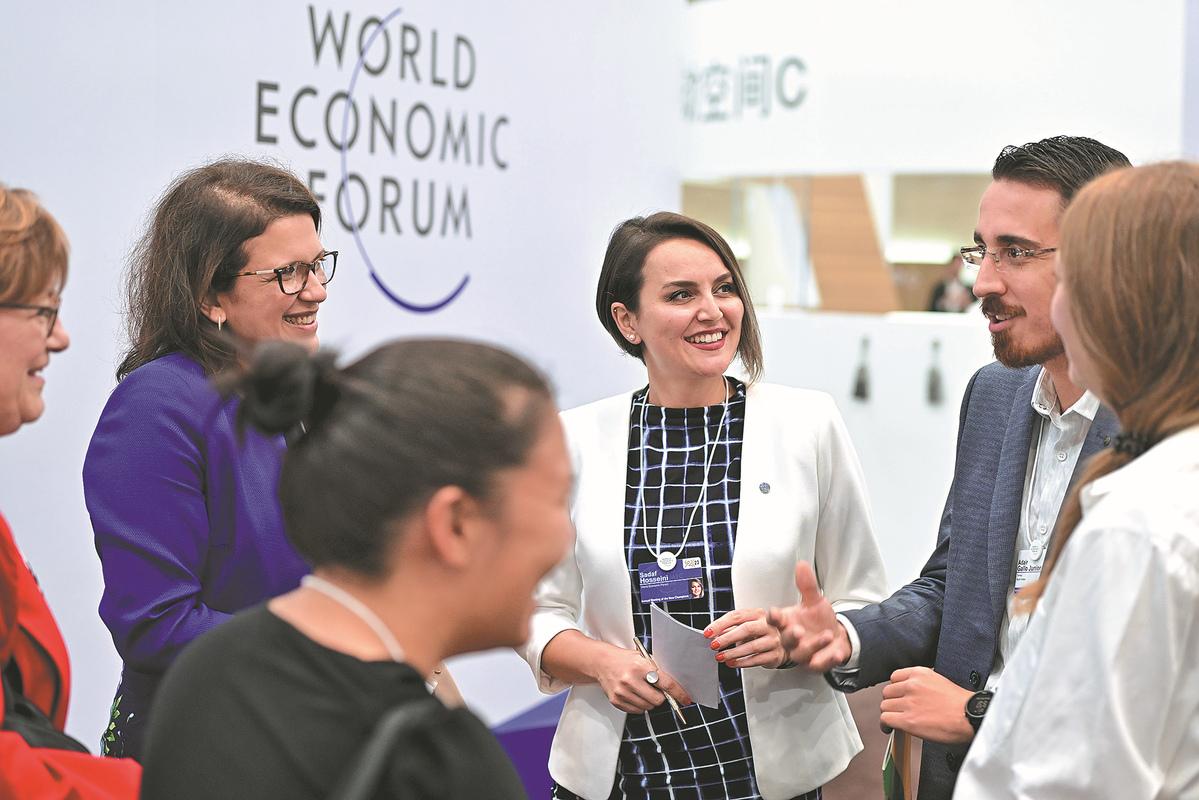Multinationals committed to China
 0 Comment(s)
0 Comment(s) Print
Print E-mail China Daily, June 29, 2023
E-mail China Daily, June 29, 2023

Entrepreneurs and industry experts exchange ideas at the Summer Davos Forum in Tianjin. [Photo/Xinhua]
Beefing up their presence in China will only move multinationals forward with stronger growth over the long term, despite rising uncertainties over decoupling and supply chain disruptions, said global business leaders and industry experts on the sidelines of the Summer Davos Forum in Tianjin.
They made the remarks as Premier Li Qiang said at the forum on Tuesday that China has full confidence and the ability to achieve steady economic growth and high-quality development for a long time to come.
The country's economy shows clear rebound and improvement momentum with the first-quarter GDP growing 4.5 percent year-on-year, and is expected to expand faster in the second quarter, Li emphasized, adding that it will offer "a consistent source of dynamism" to global economic recovery and growth.
Joe Ngai, chairman of management consultancy McKinsey China, said: "After looking at the global context we are in right now, there is no other place in the world that has the size and is still growing at the same rates we're seeing in China. The Chinese market has also been a major growth segment for multinational companies. I still believe the next China is China."
Bruce Cameron, chairman of Zespri, a cooperative of kiwi fruit growers in New Zealand, said the economic growth rates in China are still very "impressive" when compared to the rest of the world.
The latest estimates from Boston Consulting Group show that China is projected to contribute at least 25 percent of global economic growth by 2030.
"We are very confident about the Chinese economy and its ability to continue to have a strong presence here. We believe that our company and our presence here take us forward over the foreseeable future with strong growth," he said.
Such a long-term potential for economic growth is inspiring multinationals to ramp up investment, expand their talent lines and chalk up medium-to-long-term plans in the country.
Wang Rui, senior vice-president of US tech company Intel and chair of Intel China, said many international companies attach great importance to the Chinese market, and "Intel will firmly adhere to its development strategy in China".
"The Chinese market has vast opportunities and provides an open business environment. Intel's innovative technology is also in line with the high-quality development demands of the Chinese economy. This is a mutually beneficial relationship," Wang said.
George Xu, CEO of Airbus China, said: "Airbus China plans to expand its recruitment of new energy talent to support its green transformation and sustainable development."
Xu said that in China, even faced with challenges from the COVID-19 pandemic, the company increased its headcount by 15 to 20 percent on a yearly basis.
Faced with external propositions on decoupling and de-risking, Premier Li emphasized at the forum on Tuesday that the world should not and cannot return to a state of seclusion or isolation, and should oppose the politicization of economic issues and work together to keep global industrial and supply chains stable and smooth.
Such a stance was shared by company executives and industry experts at the forum.
Ngozi Okonjo-Iweala, director-general of the World Trade Organization, said during a panel discussion that decoupling and fragmentation are something that the world simply cannot afford to have.
Even with rising decoupling challenges, Wu Chun, managing partner of Boston Consulting Group Greater China, said that the country has demonstrated its resolution to join hands with all other stakeholders to tackle challenges and seek win-win outcomes, thus providing confidence and stability in an uncertain world.
It gives an extra vote of confidence for multinationals to grow in the country over the long term.
"We see China as a very long-term global market. We have no intentions of backtracking or leaving China," Cameron from Zespri said. "We are embedded here."






Go to Forum >>0 Comment(s)